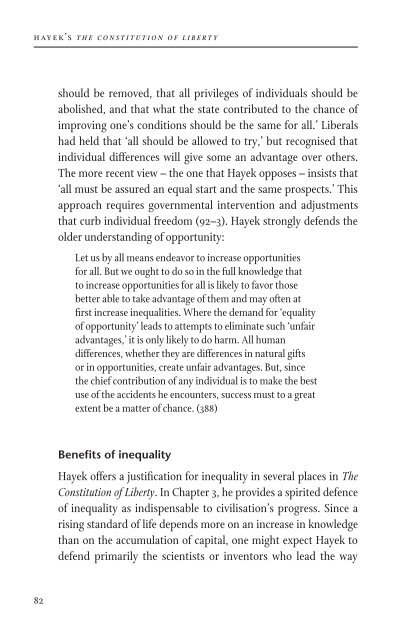Hayek's The Constitution of Liberty - Institute of Economic Affairs
Hayek's The Constitution of Liberty - Institute of Economic Affairs
Hayek's The Constitution of Liberty - Institute of Economic Affairs
Create successful ePaper yourself
Turn your PDF publications into a flip-book with our unique Google optimized e-Paper software.
h ay e k ’ s t h e c o n s t i t u t i o n o f l i b e r t y<br />
e q ua l i t y, f r e e d o m a n d j u s t d i s t r i b u t i o n<br />
should be removed, that all privileges <strong>of</strong> individuals should be<br />
abolished, and that what the state contributed to the chance <strong>of</strong><br />
improving one’s conditions should be the same for all.’ Liberals<br />
had held that ‘all should be allowed to try,’ but recognised that<br />
individual differences will give some an advantage over others.<br />
<strong>The</strong> more recent view – the one that Hayek opposes – insists that<br />
‘all must be assured an equal start and the same prospects.’ This<br />
approach requires governmental intervention and adjustments<br />
that curb individual freedom (92–3). Hayek strongly defends the<br />
older understanding <strong>of</strong> opportunity:<br />
Let us by all means endeavor to increase opportunities<br />
for all. But we ought to do so in the full knowledge that<br />
to increase opportunities for all is likely to favor those<br />
better able to take advantage <strong>of</strong> them and may <strong>of</strong>ten at<br />
first increase inequalities. Where the demand for ‘equality<br />
<strong>of</strong> opportunity’ leads to attempts to eliminate such ‘unfair<br />
advantages,’ it is only likely to do harm. All human<br />
differences, whether they are differences in natural gifts<br />
or in opportunities, create unfair advantages. But, since<br />
the chief contribution <strong>of</strong> any individual is to make the best<br />
use <strong>of</strong> the accidents he encounters, success must to a great<br />
extent be a matter <strong>of</strong> chance. (388)<br />
Benefits <strong>of</strong> inequality<br />
Hayek <strong>of</strong>fers a justification for inequality in several places in <strong>The</strong><br />
<strong>Constitution</strong> <strong>of</strong> <strong>Liberty</strong>. In Chapter 3, he provides a spirited defence<br />
<strong>of</strong> inequality as indispensable to civilisation’s progress. Since a<br />
rising standard <strong>of</strong> life depends more on an increase in knowledge<br />
than on the accumulation <strong>of</strong> capital, one might expect Hayek to<br />
defend primarily the scientists or inventors who lead the way<br />
in discovering useful knowledge. Here, however, he defends the<br />
position <strong>of</strong> the rich, whose way <strong>of</strong> life contributes a kind <strong>of</strong> unintended<br />
knowledge that is indispensable to progress. <strong>The</strong>ir contribution<br />
is to experiment ‘with a style <strong>of</strong> living that will eventually<br />
be available to many.’ Hayek avoids any distinction here between<br />
legitimate and illegitimate wealth, regardless <strong>of</strong> its source, amount<br />
or use. <strong>The</strong> rich teach the rest, but inadvertently and by example<br />
rather than by purposeful instruction.<br />
To defend inequalities <strong>of</strong> wealth, Hayek contends that ‘[t]here<br />
is no way <strong>of</strong> making generally accessible new and still expensive<br />
ways <strong>of</strong> living except by their being initially practiced by some.’<br />
Thus ‘in any phase <strong>of</strong> progress the rich, by experimenting with<br />
new styles <strong>of</strong> living not yet accessible to the poor, perform a necessary<br />
service without which the advance <strong>of</strong> the poor would be very<br />
much slower.’ As the poor seek to imitate the lifestyle <strong>of</strong> the rich,<br />
the cost <strong>of</strong> producing new goods comes down, so that eventually<br />
they become affordable to many. Indeed, ‘[e]ven the poorest<br />
today owe their relative material well-being to the results <strong>of</strong> past<br />
inequality.’ Meanwhile, the rich are beginning to enjoy new goods<br />
that will be sought by the masses some decades hence. Hayek<br />
insists that his is a valid argument and not some ‘far-fetched and<br />
cynical apologetics.’ Even so, he concedes that it will not assuage<br />
those who fail to achieve the desired results or feel ‘the pain <strong>of</strong><br />
unfulfilled desire aroused by the example <strong>of</strong> others’ (44–5). This<br />
<strong>of</strong> course gives rise to problems <strong>of</strong> justice and envy in democratic<br />
societies.<br />
Hayek goes on to apply this argument to the international<br />
scene, holding that the poor nations learn much from the rich<br />
ones and, by aspiring to imitate them, contribute both to their<br />
own progress and to that <strong>of</strong> civilisation. His key point here is<br />
82<br />
83












